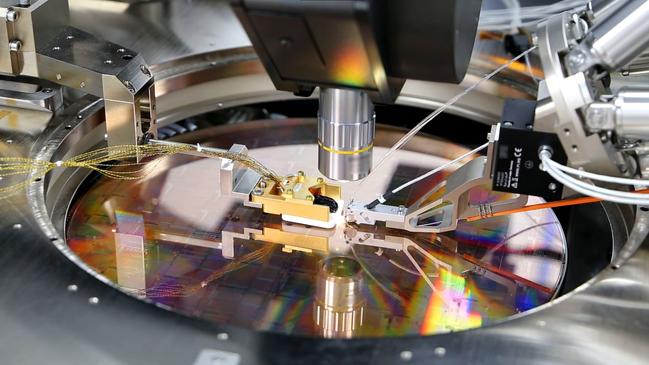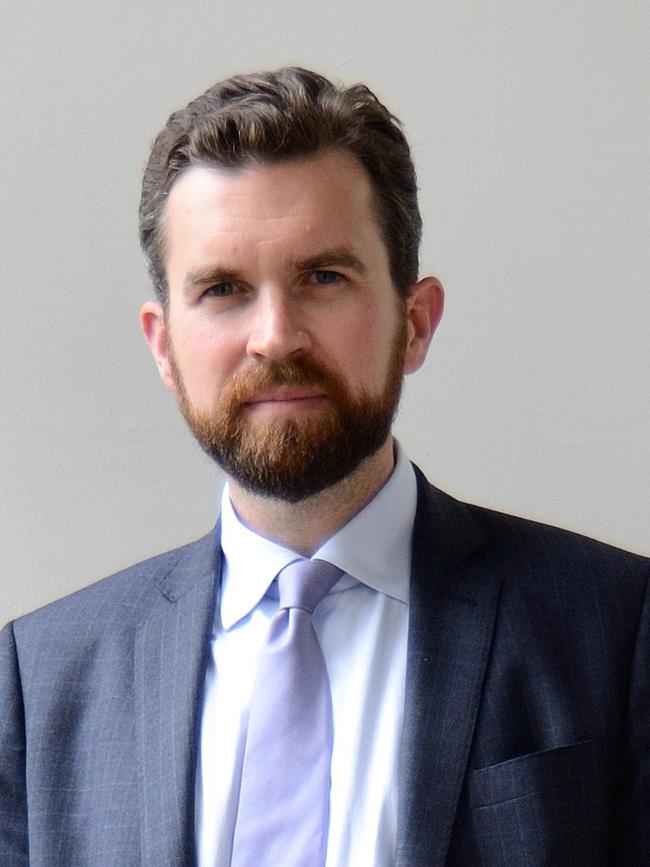Australian start-up PsiQuantum takes $3bn leap to build supercomputer
Australian Jeremy O’Brien has taken a giant step towards building the world’s first commercially viable quantum computer.

Business
Don't miss out on the headlines from Business. Followed categories will be added to My News.
Australian Jeremy O’Brien has taken a giant step towards building the world’s first commercially viable quantum computer, with his start-up, PsiQuantum, landing a $US450m ($611m) funding round from investors – including Australian Canva backers Blackbird Ventures – valuing it at $US3.15bn.
Mr O’Brien received his PhD in physics from the University of NSW in 2002, and now he and his team are on the cusp of building a fault-tolerant quantum computer to tackle breakthrough applications in climate, energy, life sciences and beyond.
The Silicon Valley-based PsiQuantum has now raised $US665m in funding. This round was led by funds and accounts managed by BlackRock, along with participation from insiders such as Baillie Gifford and Microsoft venture fund M12, Playground Global, and new investors including Blackbird Ventures and Temasek.
The company said the funds would be used to boost its team of about 150 people and build a one million quantum-bit machine, which could solve problems many millions of times faster than a conventional computer.
The company has developed a unique technology in which single photons (particles of light) are manipulated using photonic circuits that are patterned on to a silicon chip using standard semiconductor manufacturing processes.

Otherwise impossible problems across climate, energy, healthcare, finance, agriculture, transportation, materials design and more are all anticipated to be unlocked thanks to extraordinary advances in quantum computing.
“Quantum computing is the most profoundly world-changing technology uncovered to date,” Mr O’Brien said.
“It is my conviction that the way to bring this technology into reality is by using photonics.
“Our company was founded on the understanding that leveraging semiconductor manufacturing is the only way to deliver the million qubits that are known to be required for error correction, a prerequisite for commercially valuable quantum computing applications. This funding round is a major vote of confidence for that approach.”
Playground Global, the venture capital fund founded by the inventor of the Android operating system, Andy Rubin, is one of the longest investors in PsiQuantum. Its general partner, Australian Peter Barrett, said that the company was streets ahead of its competition when it came to achieving a useful quantum computer.
PsiQuantum is hoping to have the computer ready by the middle of the decade. It already has clients signed up, including big car companies, banks and healthcare organisations that need more computational power than the current crop of supercomputers to solve their challenges.
“This isn’t about ‘Give me a billion dollars and a quantum computer will pop out’, it’s against the specific roadmap of world records and technological breakthroughs, which continue to track towards the creation of the machine, and help us answer these impossible questions,” Mr Barrett said.

The start-up’s co-founder, Terry Rudolph, said it was impossible to calculate the potential of quantum computing’s impact, given the scale of the problems it would hopefully eventually solve.
Traditional computers store information as either zeros or ones, while quantum computers use quantum bits, or qubits, which represent and store information in a quantum state that is a complex mix of zero and one. Mr Rudolph said PsiQuantum planned to build its machine using photons, or particles of light, as qubits.
“The first problems are how do we design better batteries or solar cells or particular drugs, and these are the easiest problems to see immediately, but in terms of societal, impact, even a fairly small quantum computer will be able to give us this big jump in our ability to simulate new processes and just do things we wouldn’t have even considered doing,” he said.
Fellow PsiQuantum co-founder and chief strategist Pete Shadbolt said the same semiconductor factories that made laptops and smartphones would soon be able to manufacture quantum computers, which was one of his company’s competitive advantages. In the global quantum race, PsiQuantum is up against some heavy hitters such as IBM, Google and IonQ, which are using different approaches.
“What better project could I spend my life on?” Mr Shadbolt said. “This is one of the most, if not the most, extraordinary technical challenges happening anywhere on this planet. There is incredible upside, incredible depth and breadth of technical complexity.”
Blackbird Ventures principal Michael Tolo said that his company was looking to invest in the best team building a quantum computer.
“It‘s hard to overstate how great this team is, and the results will speak for themselves over the next five to 10 years,” he said.
Originally published as Australian start-up PsiQuantum takes $3bn leap to build supercomputer





